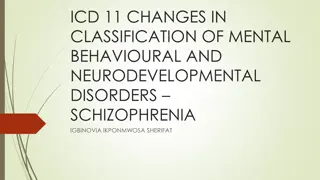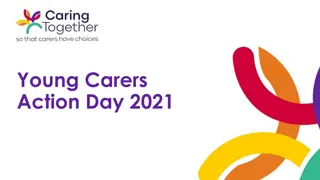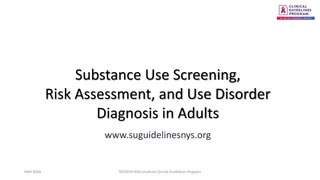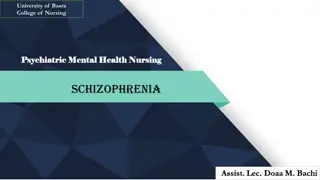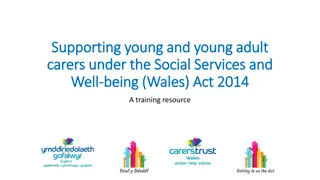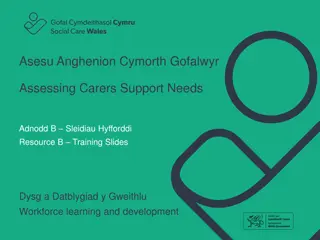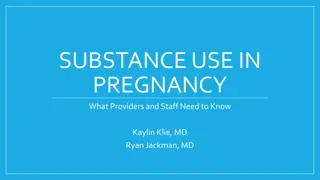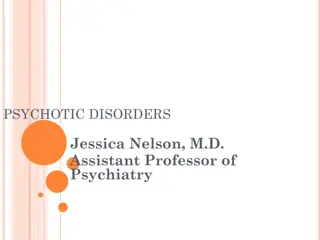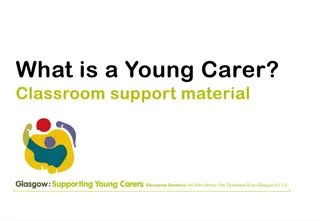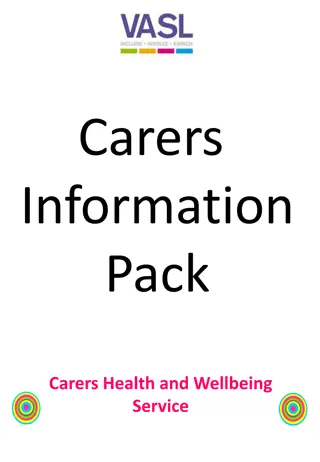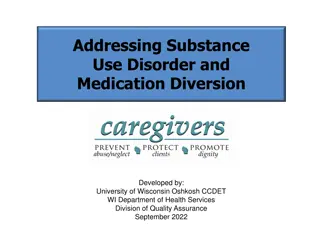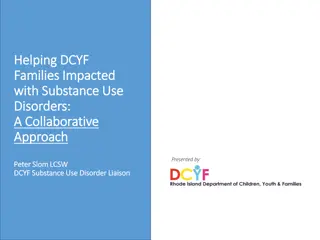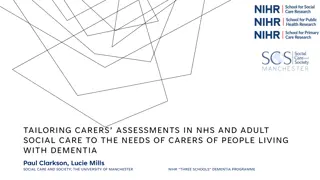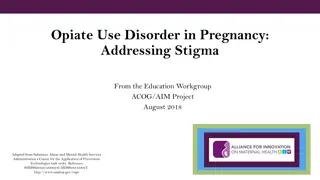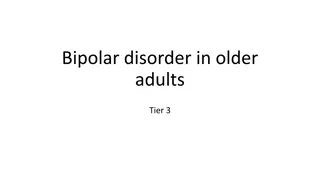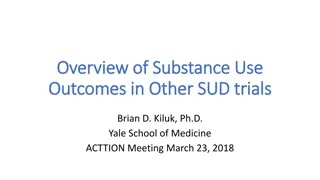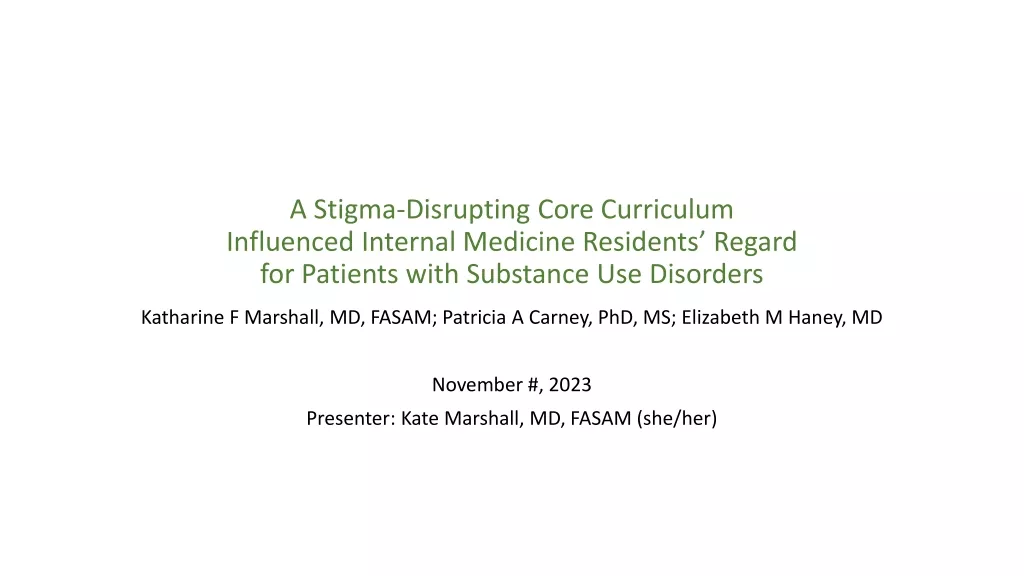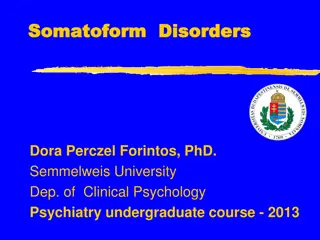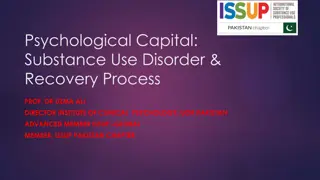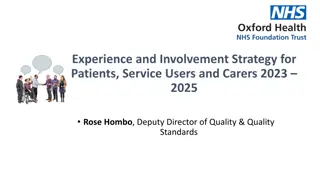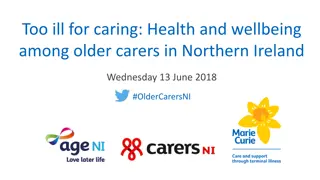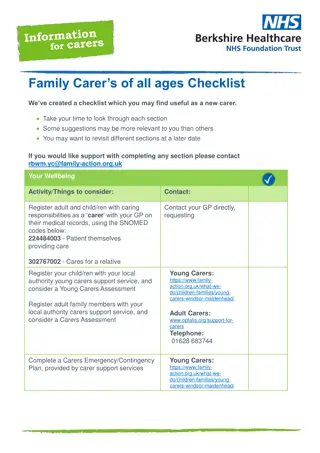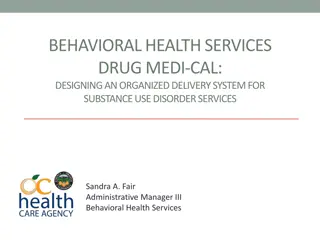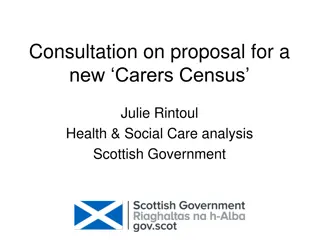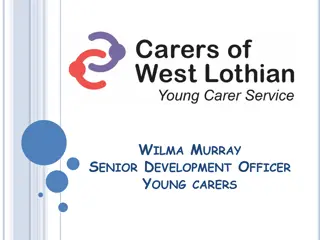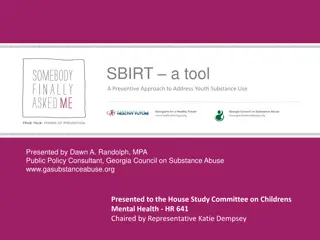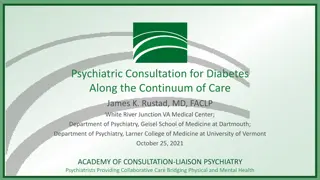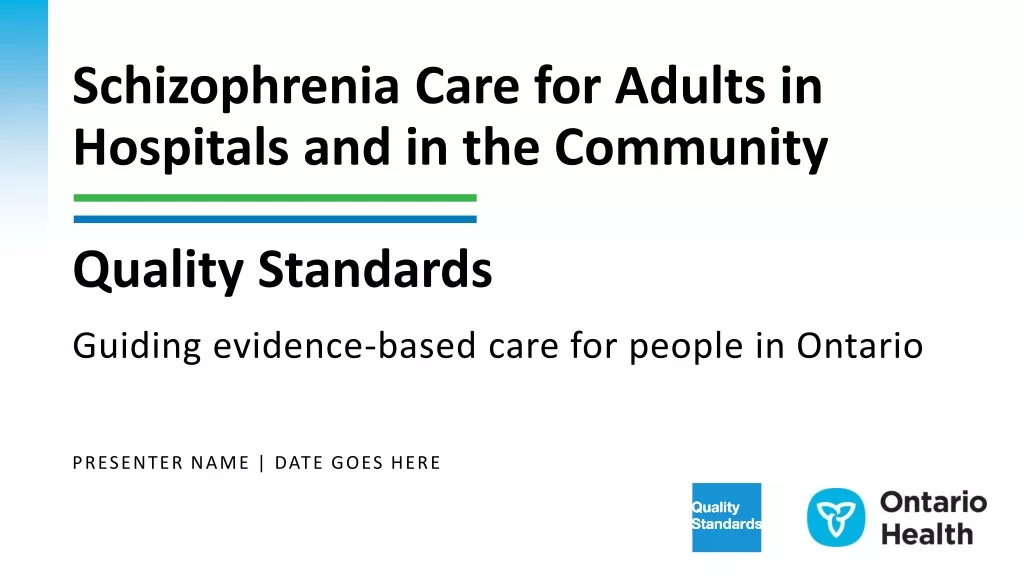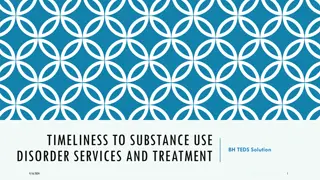Understanding the Needs of Carers Supporting Individuals with Schizophrenia and Substance Use Disorder
This study focuses on identifying and prioritizing the needs of carers who support individuals living with schizophrenia and a substance use disorder. The research highlights the challenges faced by carers, the positive effects of their support, and the lack of studies addressing their specific needs. By understanding these needs, interventions can be designed to better support carers in their important role.
Download Presentation

Please find below an Image/Link to download the presentation.
The content on the website is provided AS IS for your information and personal use only. It may not be sold, licensed, or shared on other websites without obtaining consent from the author. Download presentation by click this link. If you encounter any issues during the download, it is possible that the publisher has removed the file from their server.
E N D
Presentation Transcript
The Needs of Carers Who Support People Living with Schizophrenia and a Substance Use Disorder Karine Gaudreault PhD, Jo l Tremblay PhD & Karine Bertrand PhD
Study context - 25% people will act as an informal caregiver for a loved one at least once in their lives - Young people receive this kind of care, 9 out of 10 do so because of their mental health - Those who care for someone living with schizophrenia, describe this task as a heavy load, and they are usually family members and come from networks that are on average 2.5 X smaller than other types of carers (Canada, 2020; Canada, 2018; Koenders et al., 2017)
Study context - 50% of those living with schizophrenia also develop a substance use disorder (therefore PLS-SUD for those with both disorders) during their lifetime - + the number of requests for support from their carers who then invest a greater number of hours in these tasks - The carers themselves can experience several positive effects stemming from their support and they still get involved even when facing great difficulties (Ayano, 2019; Carr et al., 2012; Hunt et al., 2018; Fleury et al., 2015; Hguelet et al., 2012; Labrum, 2020; Velligan et al., 2019; Agrawal & Lynskey, 2008; Labrum & Salomon )
Study context - Despite the recognition of the importance of the role of carers in the recovery of a PLS-SUD, few studies have focused on describing and understanding their own needs.
Aims This study aims to identify, understand and This study aims to identify, understand and prioritize the needs of PLS prioritize the needs of PLS- -SUD carers in the context of intervention design. context of intervention design. SUD carers in the
Methodology: study procedure Research approach Project Part of a larger project aimed at developing and implementing a program designed to support PLS- SUD carers Participatory Learning and Action
Procedure - - - Research committee 7 meeting/15 months 1-Knowledge sharing; 2- Review of litt rature; 3- Consensus = Summary Phase #1 Phase #1 - Opinion expressed by carer and facilitators were collected Phase #2b Phase #2b - Phase #3 Phase #3 Phase #2a Phase #2a Research committee Coconstruction and implementation need program 9 parents take part in the designed program - - - Research committee synthesized the results, identifying and ranking needs -
Study population 1- Members for the research committee 3- PLS-SUD carers (program participant) 2- Program facilitators
- Purposeful sample with variation - 8 clinicians - 2 managers/coordintors - 2 carers - 7 + years of experience - 1 had a collegiate-level degree, 11 university degrees. - 2 carers had supported one or two PLS-SUDs for 20 years + Members for the research committee and facilitators characteristics
Age 50 to 59: 5 60 to 69: 4 Group carer s characteristics Ethnicity: Caucasian 9 Sex M: 2 F: 7 Status Married/common law: 7 Separated/divorced: 1 Widowed: 1 Gross family income $20,001 to $40,000: 1 $40,001 to $60,000: 3 $80,001 and over: 5 Education High school: 7 University: 2 Regularly: 3 Never: 5 In contact with their PLS-SUD s follow-up team Stopped during the study: 1 Contacts with community-based organization for mental health Sporadic: 2 None: 7 caregivers
Conceptual framework Client Supporter Partner Themselves Acquire knowledge on how to better support PLS- SUD Work with the health care system or the community (Bonin et al., 2014; Fradet, 2012)
Phase #1 Phase #2 Phase #3 60 needs 49 needs been prioritized and chosen 7 priority 3 new needs 1 complementary need 50 needs been prioritized and chosen 2 complementary needs
Results Client 18 needs 1 1- -Be accepted and welcomed by professionals as people with specific needs 2 2- -Support Be accepted and welcomed by professionals as people with specific needs Support
Client Be accepted and welcomed by professionals as people with specific needs Committee Litterature Chosen Carer s group 2 1-Receive bespoke services as a family living with a PLS-SUD X X X X 2-Be unconditionally welcomed when they express themselves on flaws in the health care system when it comes to carer needs 3-Receive support adapted to preferences and choices 1 X X X Priority X 4-Receive services that account for the carer s sense of family loyalty (e.g. , respect the desire to stay connected despite the difficulties experienced) 1 3 X X X 5-Improve or maintain satisfaction in the role of supporter
Client Be accepted and welcomed by professionals as people with specific needs Committee Litterature Chosen Carer s group X X 5 X X X X X 6-Reduce exhaustion (perceived and real) 7-Reduce personal distress 8-Prevent mental health issues within the extended family, already more at risk 4 1 3 X X X 8-Taking care of one s own physical health 7 X X X 9-Improve hopefulness when faced with crisis, substance use relapses, renewed psychotic episodes, learn to regain confidence by thinking long term Priority
Client Be accepted and welcomed by professionals as people with specific needs Committee Litterature Chosen Carer s group 1 X 10-Plan complementary support sources for their PLS- SUD as aging carers (i.e., who will give support when the carer passes away ) 11-Increase the amount of free time, personal activities and social ties for every family member 12-Accept living one s own life, even if the PLS-SUD s is sometimes filled with drama 13-Facilitate mourning tied to the situation of the PLS- SUD 14-Better recognize the impact of spirituality on recovery as a carer 3 X X X X X X 1 X X
Client Support Committee Litterature Chosen Carer s group X X X Priority 15-Reduce isolation and share with other carers living the same situation 4 16-Reduce loneliness as a carer living with both stigmasX X X 2 3 Request for out-group support and a sharing space later X 17-Support the development of a network of professionals and support teams that can help the carer when it comes to one-time, crisis and long-term needs: long-term support process 18-Design requests to be supported by care services X X 2
Results Supporter 35 needs 1-Role as supporter 2-Knowledge: - About concurrent disorders - General knowledge - Substances, and adaptive attitudes and behaviours - Psychotic disorders, and adaptive attitudes and behaviours - Crisis situations, and adaptive attitudes and behaviours 7-PLS-SUD autonomy
Supporter Role as supporter Committee Litterature Chosen Carer s group X 1-Use personal strengths to develop new skills and knowledge X X Priority X X X 2-Develop the ability to apply strengths when dealing with their PLS-SUD to favour their recovery, support hopefulness and improve self-esteem 3-Better recognize limits and express those to the PLS-SUD 1 1 X X X X X 4-Improve communication skills to reduce intrafamily stress 4 Priority X 2 X 5-Improve positive active adaptation skills
Supporter Role as supporter Committee Litterature Chosen Carer s group X X X 6-Be guided through accepting the double problem the PLS- SUD faces and improve resiliency as a carer 2 X X X X X X 7-Be supported by the whole family in the role of carer 1 8-Be supported as a carer (informed choices, consistency, exploration and understanding of the meaning of change for their PLS-SUD) 3 9-Offer support to carers in their direct support for their PLS- SUD: documents, financial documents 1
Supporter Knowledge about concurrent disorders Committee Litterature Chosen Carer s group X X X 10-Increase knowledge of concurrent disorders 4 Priority X X 11-Find information on treatments to take informed decisions on which to support 2 1 X X X 12-Understand how the family can contribute to recovery from the concurrent disorder 13-Accept the unique rhythm of the PLS-SUD (often slower than the carer would like) 14-Understand the prognosis and impacts of the concurrent disorder on the PLS-SUD X X X X X X Add testimony of a recovered PLS-SUD
Supporter Knowledge about concurrent disorders Committee Litterature Chosen Carer s group X Add according to the group s needs X 15-Understand the available resources for concurrent disorders, and how to refer the PLS-SUD to them 2 X 16-Understand the stages of treatment for the PLS-SUD, adapting interactions to help reduce substance use 2 X X X X 17-Be accompanied to put into practice the acquired knowledge, before using it with their PLS-SUD
Supporter General knowledge Commit tee X Litteratu re 1 Chose n Carer s group Complementary sessions X 18-Understand the legal modalities that can apply to the PLS- SUD to better support them and take part in the decision-making 19-Reduce criticism and hostile behaviours toward the PLS-SUD 20-Understand the risks of infection for PLS-SUD (for those who inject substances) X 4 1 2 21-Understand the physical illnesses that regularly occur in PLS-SUD 1 22-Adjust beliefs held by the carer concerning the level of self-control the PLS-SUD can exert over their psychotic symptoms X 2 X 23-Adjust beliefs held by the carer about how much control the PLS- SUD could, if they wanted to, exert on their substance use and thus how much they could limit the symptoms related to the psychotic disorder and the SUD
Supporter Knowledge concerning substances, and adaptive attitudes and behaviours Committee Litterature Chosen Carer s group X X 24-Develop relational attitudes and skills that favour an increase in motivation for the PLS-SUD to reduce and stop the use of psychoactive substances 25-Learn to identify patterns of substance use by the PLS- SUD and how not to enable them 26-Better understand alcohol and drugs, and their impact on the PLS-SUD in the context of psychotropic medication 4 X X X X X X Priority X 1 X X 27-Understand why the PLS-SUD uses substances 1 X X X 28-Know what to do when the PLS-SUD is intoxicated and relapsing into substance use
Supporter Knowledge concerning psychotic disorders, and adaptive attitudes and behaviours Committee Litterature Chosen Carer s group 29-Understand the medication and adherence strategies of their PLS-SUD 3 30-Improve communication skills about the PLS 1
Supporter Knowledge concerning crisis situations, and adaptive attitudes and behaviours Committee Litterature Chosen Carer s group 31-Understand what to do during a suicidal crisis, and when the PLS-SUD is aggressive toward people or things 2 X X 32-Understand the relevant resources during periods of crisis X X X
Supporter PLS-SUD autonomy Committee Litterature Chosen Carer s group 33-Take more strategic financial decisions with their PLS- SUD (i.e., buying food or not) 1 34-Reduce financial exposure to the PLS-SUD 1 35-Favour improvement of the PLS-SUD participation in the community 1
Results Partner 5 needs 1-Society
Partner Society Committee Litterature Chosen Carer s group 1-Reduce poverty for PLS-SUD 1 2-Reduce violence toward PLS-SUD 2 3-Favour increasing financial support for carers X 4-Reduce stigmatization relating to mental health 1 X 5-Increase awareness in health care practitioners about the need to integrate services in mental health and SUD for PLS- SUD X X X
Personally, I would have liked to call the therapists outside the group setting to ask questions, to request support. Having a coffee after a session would be very important. In our daily lives, we forget what we ve learned, the tools. When events are organized, it helps us remember. [Translation] PLS-SUD carer in focus group.
Discussion -When supporting PLS-SUDs, carers experience many different and important needs, but those tend to also fluctuate over time. -Based on an approach that enhances the initial survey that had been developed, integrating the participants' perspectives has made it possible to document as a first step the diversity and complexity of the needs felt and their evolution over time.
Discussion -To adequately meet the different priority needs experienced by PLS-SUD carers, which can change based on the context and the hardships being faced, services should be created specifically for them. -However, this rarely happens.
Discussion -Our results have uncovered tree needs that are not already covered by the programs we have documented. 1) The participants expressed the need to better understand the SUD, but not the psychotic disorder. 2) The need to better understand the interaction between the psychotic disorder and the SUD has not been documented elsewhere. 3) The carers expressed the need that their strengths and experiences be taken into account.
Conclusion -People who care for PLS-SUDs have specific needs and should be able to benefit from dedicated services. -Working with carers has the potential to improve their well- being, but also to improve the long-term support provided by carers to their PLS-SUD and the well-being of the latter.
Bilbio Agrawal, A., & Lynskey, M. T. (2008). Are there genetic influences on addiction: evidence from family, adoption and twin studies. Addiction 103(7), 1069-1081. https://doi.org/10.1111/j.1360-0443.2008.02213.x Ayano, G. (2019). Co-occurring medical and substance use disorders in patients with schizophrenia: a systematic review. International Journal of Mental Health, 48(1), 62-76. https://doi.org/10.1080/00207411.2019.1581047 Bonin, J.-P., Chicoine, G., Fradet, H. l. n., Larue, C., Racine, H. l. n., Jacques, M.-C., & St-Cyr Tribble, D. (2014). Le ro le des familles au sein du syste me de sante mentale au Que bec. Sante mentale au Quebec, 39(1), 159- 173. https://doi.org/10.7202/1025912ar Canada, S. (2018). Enqu te sociale ge ne rale : Soins donne s et re us. Canada, S. (2020). Regards sur la socie te canadienne: Soutien re u par les aidants au Canada. Carr , G., Johnson, S., Bebbington, P., Angermeyer, M. C., Heider, D., Brugha, T., Azorin, J.-M., & Toumi, M. (2012). The lifetime and past-year prevalence of dual diagnosis in people with schizophrenia across Europe: findings from the European Schizophrenia Cohort (EuroSC). European Archives of Psychiatry and Clinical Neuroscience, 262(7), 607-616. https://doi.org/10.1007/s00406-012-0305-z
Bilbio Fleury, M.-J., Grenier, G., & Bamvita, J.-M. (2015). Predictors of frequent recourse to health professionals by people with severe mental disorders. Canadian journal of psychiatry. Revue canadienne de psychiatrie, 60(2), 77-86. https://doi.org/https://doi-org.ezproxy.usherbrooke.ca/10.1177/070674371506000205 Fradet, H. (2012). L'indispensable: guide l'intention des membres de l'entourage d'une personne atteinte de maladie mentale. In F. d. f. e. a. d. l. p. a. d. m. mentale (Ed.). Huguelet, P., Koellner, V., Boulguy, S., Nagalingum, K., Amani, S., Borras, L., & Perroud, N. (2012). Patients souffrant de troubles psychiatriques s v res suivis par une quipe mobile: Impact sur leurs familles = Study of the impact of an assertive community program on the families of patients with severe mental disorders. L'Enc phale: Revue de psychiatrie clinique biologique et th rapeutique, 38(3), 201-210. https://doi.org/10.1016/j.encep.2011.11.006 Hunt, G. E., Large, M. M., Cleary, M., Lai, H. M. X., & Saunders, J. B. (2018). Prevalence of comorbid substance use in schizophrenia spectrum disorders in community and clinical settings, 1990-2017: Systematic review and meta-analysis. Drug & Alcohol Dependence, 191, 234-258. https://doi.org/10.1016/j.drugalcdep.2018.07.011
Bilbio Koenders, J. F., de Mooij, L. D., Dekker, J. M., & Kikkert, M. (2017). Social inclusion and relationship satisfaction of patients with a severe mental illness. International Journal of Social Psychiatry, 63(8), 773-781. https://doi.org/10.1177/0020764017737572 Labrum, T. (2018). Caregiving for Relatives with Psychiatric Disorders vs. Co-Occurring Psychiatric and Substance Use Disorders. The Psychiatric quarterly, 89(3), 631-644. https://doi.org/10.1007/s11126-017- 9557-0 Labrum, T. (2020). Persons with serious mental illness help relatives: rates and correlates of assistance. Journal of Mental Health, 29(3), 328-335. https://doi.org/10.1080/09638237.2020.1739246 Labrum, T., & Solomon, P. (2018). Safety fears held by caregivers about relatives with psychiatric disorders. Health & Social Work, 43(3), 165-173. https://search.ebscohost.com/login.aspx?direct=true&db=swh&AN=91478&site=ehost-live Les soins en chiffres : Les soins re us pour un probl me de sant mentale. (2018). Velligan, D. I., Brain, C., Bou rat Duvold, L., & Agid, O. (2019). Caregiver Burdens Associated With Treatment- Resistant Schizophrenia: A Quantitative Caregiver Survey of Experiences, Attitudes, and Perceptions. Frontiers in Psychiatry, 10, 584. https://doi.org/10.3389/fpsyt.2019.00584


